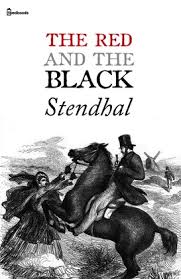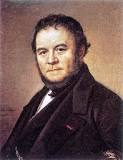The Red and the Black Page #21
Le Rouge et le Noir is a historical psychological novel in two volumes by Stendhal, published in 1830. It chronicles the attempts of a provincial young man to rise socially beyond his modest upbringing through a combination of talent, hard work, deception, and hypocrisy.
"So" she said to him as she went away, "it is a little round box of black cardboard, very glossy." "Yes, Madame," answered Julien, with that hardness which danger gives to men. She ascended the second storey of the château as pale as though she had been going to her death. Her misery was completed by the sensation that she was on the verge of falling ill, but the necessity of doing Julien a service restored her strength. "I must have that box," she said to herself, as she doubled her pace. She heard her husband speaking to the valet in Julien's very room. Happily, they passed into the children's room. She lifted up the mattress, and plunged her hand into the stuffing so violently that she bruised her fingers. But, though she was very sensitive to slight pain of this kind, she was not conscious of it now, for she felt almost simultaneously the smooth surface of the cardboard box. She seized it and disappeared. She had scarcely recovered from the fear of being surprised by her husband than the horror with which this box inspired her came within an ace of positively making her feel ill. "So Julien is in love, and I hold here the portrait of the woman whom he loves!" Seated on the chair in the ante-chamber of his apartment, Madame de Rênal fell a prey to all the horrors of jealousy. Her extreme ignorance, moreover, was useful to her at this juncture; her astonishment mitigated her grief. Julien seized the box without thanking her or saying a single word, and ran into his room, where he lit a fire and immediately burnt it. He was pale and in a state of collapse. He exaggerated the extent of the danger which he had undergone. "Finding Napoleon's portrait," he said to himself, "in the possession of a man who professes so great a hate for the usurper! Found, too, by M. de Rênal, who is so great an ultra, and is now in a state of irritation, and, to complete my imprudence, lines written in my own handwriting on the white cardboard behind the portrait, lines, too, which can leave no doubt on the score of my excessive admiration. And each of these transports of love is dated. There was one the day before yesterday." "All my reputation collapsed and shattered in a moment," said Julien to himself as he watched the box burn, "and my reputation is my only asset. It is all I have to live by--and what a life to, by heaven!" An hour afterwards, this fatigue, together with the pity which he felt for himself made him inclined to be more tender. He met Madame de Rênal and took her hand, which he kissed with more sincerity than he had ever done before. She blushed with happiness and almost simultaneously rebuffed Julien with all the anger of jealousy. Julien's pride which had been so recently wounded made him act foolishly at this juncture. He saw in Madame de Rênal nothing but a rich woman, he disdainfully let her hand fall and went away. He went and walked about meditatively in the garden. Soon a bitter smile appeared on his lips. "Here I am walking about as serenely as a man who is master of his own time. I am not bothering about the children! I am exposing myself to M. de Rênal's humiliating remarks, and he will be quite right." He ran to the children's room. The caresses of the youngest child, whom he loved very much, somewhat calmed his agony. "He does not despise me yet," thought Julien. But he soon reproached himself for this alleviation of his agony as though it were a new weakness. The children caress me just in the same way in which they would caress the young hunting-hound which was bought yesterday. CHAPTER X A GREAT HEART AND A SMALL FORTUNE But passion most disembles, yet betrays, Even by its darkness, as the blackest sky Foretells the heaviest tempest. Don Juan, c. 4, st. 75. M. De Rênal was going through all the rooms in the château, and he came back into the children's room with the servants who were bringing back the stuffings of the mattresses. The sudden entry of this man had the effect on Julien of the drop of water which makes the pot overflow. Looking paler and more sinister than usual, he rushed towards him. M. de Rênal stopped and looked at his servants. "Monsieur," said Julien to him, "Do you think your children would have made the progress they have made with me with any other tutor? If you answer 'No,'" continued Julien so quickly that M. de Rênal did not have time to speak, "how dare you reproach me with neglecting them?" M. de Rênal, who had scarcely recovered from his fright, concluded from the strange tone he saw this little peasant assume, that he had some advantageous offer in his pocket, and that he was going to leave him. The more he spoke the more Julien's anger increased, "I can live without you, Monsieur," he added. "I am really sorry to see you so upset," answered M. de Rênal shuddering a little. The servants were ten yards off engaged in making the beds. "That is not what I mean, Monsieur," replied Julien quite beside himself. "Think of the infamous words that you have addressed to me, and before women too." M. de Rênal understood only too well what Julien was asking, and a painful conflict tore his soul. It happened that Julien, who was really mad with rage, cried out, "I know where to go, Monsieur, when I leave your house." At these words M. de Rênal saw Julien installed with M. Valenod. "Well, sir," he said at last with a sigh, just as though he had called in a surgeon to perform the most painful operation, "I accede to your request. I will give you fifty francs a month. Starting from the day after to-morrow which is the first of the month." Julien wanted to laugh, and stood there dumbfounded. All his anger had vanished. "I do not despise the brute enough," he said to himself. "I have no doubt that that is the greatest apology that so base a soul can make." The children who had listened to this scene with gaping mouths, ran into the garden to tell their mother that M. Julien was very angry, but that he was going to have fifty francs a month. Julien followed them as a matter of habit without even looking at M. de Rênal whom he left in a considerable state of irritation. "That makes one hundred and sixty-eight francs," said the mayor to himself, "that M. Valenod has cost me. I must absolutely speak a few strong words to him about his contract to provide for the foundlings." A minute afterwards Julien found himself opposite M. de Rênal. "I want to speak to M. Chélan on a matter of conscience. I have the honour to inform you that I shall be absent some hours." "Why, my dear Julien," said M. de Rênal smiling with the falsest expression possible, "take the whole day, and to-morrow too if you like, my good friend. Take the gardener's horse to go to Verrières." "He is on the very point," said M. de Rênal to himself, "of giving an answer to Valenod. He has promised me nothing, but I must let this hot-headed young man have time to cool down."
Translation
Translate and read this book in other languages:
Select another language:
- - Select -
- 简体中文 (Chinese - Simplified)
- 繁體中文 (Chinese - Traditional)
- Español (Spanish)
- Esperanto (Esperanto)
- 日本語 (Japanese)
- Português (Portuguese)
- Deutsch (German)
- العربية (Arabic)
- Français (French)
- Русский (Russian)
- ಕನ್ನಡ (Kannada)
- 한국어 (Korean)
- עברית (Hebrew)
- Gaeilge (Irish)
- Українська (Ukrainian)
- اردو (Urdu)
- Magyar (Hungarian)
- मानक हिन्दी (Hindi)
- Indonesia (Indonesian)
- Italiano (Italian)
- தமிழ் (Tamil)
- Türkçe (Turkish)
- తెలుగు (Telugu)
- ภาษาไทย (Thai)
- Tiếng Việt (Vietnamese)
- Čeština (Czech)
- Polski (Polish)
- Bahasa Indonesia (Indonesian)
- Românește (Romanian)
- Nederlands (Dutch)
- Ελληνικά (Greek)
- Latinum (Latin)
- Svenska (Swedish)
- Dansk (Danish)
- Suomi (Finnish)
- فارسی (Persian)
- ייִדיש (Yiddish)
- հայերեն (Armenian)
- Norsk (Norwegian)
- English (English)
Citation
Use the citation below to add this book to your bibliography:
Style:MLAChicagoAPA
"The Red and the Black Books." Literature.com. STANDS4 LLC, 2025. Web. 11 Mar. 2025. <https://www.literature.com/book/the_red_and_the_black_201>.








Discuss this The Red and the Black book with the community:
Report Comment
We're doing our best to make sure our content is useful, accurate and safe.
If by any chance you spot an inappropriate comment while navigating through our website please use this form to let us know, and we'll take care of it shortly.
Attachment
You need to be logged in to favorite.
Log In